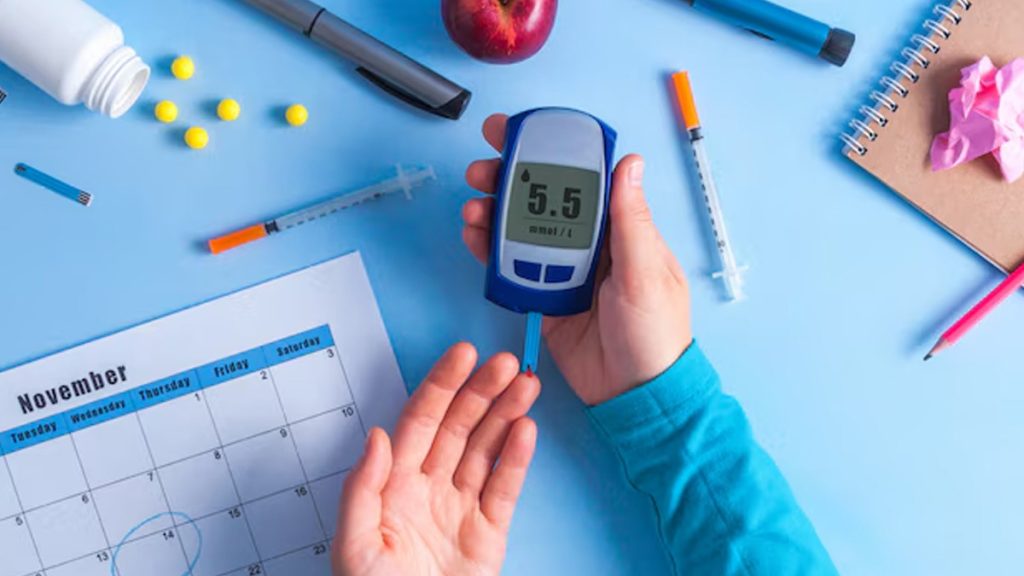Type 2 diabetes is a growing global health concern, impacting millions of individuals every year. While many associate it primarily with high blood sugar, its complications reach far beyond glucose control. Chronic diabetes can quietly damage the heart, kidneys, and nerves, leading to serious, sometimes life-threatening conditions.
At First Point MD, we understand that managing diabetes goes beyond regulating blood sugar—it’s about safeguarding your body’s most vital systems. This comprehensive guide explores how Type 2 diabetes affects cardiovascular, renal, and nervous system health, and what you can do to protect yourself through proactive medical care and lifestyle management.
Understanding Type 2 Diabetes: The Foundation of Complications
Type 2 diabetes is a metabolic disorder characterized by insulin resistance—a condition where the body’s cells no longer respond effectively to insulin, the hormone responsible for moving glucose from the blood into cells for energy. As a result, glucose accumulates in the bloodstream, leading to hyperglycemia.
Over time, persistent high blood sugar damages blood vessels and organs, increasing the risk of serious complications affecting the heart, kidneys, and nerves.
According to the Centers for Disease Control and Prevention (CDC), people with Type 2 diabetes are twice as likely to develop heart disease and are at significantly higher risk for kidney failure and nerve damage.
How Type 2 Diabetes Affects Heart Health
The connection between diabetes and heart disease is one of the most well-documented in medicine. High blood sugar levels can damage blood vessels and the nerves that control the heart, making cardiovascular disease (CVD) the leading cause of death among people with diabetes.
Damage to Blood Vessels
Excess glucose in the bloodstream reacts with proteins in vessel walls, leading to inflammation and plaque buildup (atherosclerosis). This thickens and stiffens arteries, reducing blood flow and increasing the risk of:
-
Coronary artery disease (CAD)
-
Heart attack (myocardial infarction)
-
Stroke
-
Peripheral artery disease (PAD)
High Blood Pressure and Cholesterol
People with diabetes often have accompanying hypertension and dyslipidemia (abnormal cholesterol levels). Elevated LDL (“bad”) cholesterol and triglycerides, combined with low HDL (“good”) cholesterol, further accelerate arterial damage.
Diabetic Cardiomyopathy
Chronic high blood sugar weakens heart muscle tissue, leading to diabetic cardiomyopathy—a condition that can cause heart failure even in the absence of coronary artery disease.
Symptoms to Watch For
Heart-related complications may develop gradually and can be silent until advanced stages. Warning signs include:
-
Chest pain or discomfort
-
Shortness of breath
-
Fatigue or weakness
-
Swelling in legs, ankles, or feet
-
Irregular heartbeat
Prevention and Management
At First Point MD, our providers emphasize a comprehensive cardiovascular care plan that includes:
-
Regular blood pressure and cholesterol monitoring
-
Strict blood sugar management
-
Heart-healthy diet (rich in fiber, fruits, vegetables, and whole grains)
-
Regular physical activity
-
Avoidance of tobacco and excessive alcohol
-
Use of medications such as statins or ACE inhibitors when indicated
With proper management, many diabetes-related heart issues can be prevented or reversed.
How Type 2 Diabetes Affects Kidney Health
Your kidneys filter waste and excess fluids from the blood, maintaining the body’s delicate balance of electrolytes and nutrients. However, high blood sugar over time damages these filtering units (nephrons), leading to diabetic nephropathy, a major cause of chronic kidney disease (CKD) and kidney failure.
The Early Stages: Silent Damage
In the early stages of diabetic kidney disease, damage occurs gradually and silently. Elevated glucose levels cause the kidneys to overwork, straining the filtration process. Tiny blood vessels within the kidneys become scarred and less efficient.
Progressive Decline in Function
As damage progresses, kidneys start leaking protein (albumin) into the urine—a key warning sign known as microalbuminuria. Without intervention, this leads to macroalbuminuria and ultimately renal failure, where dialysis or a kidney transplant may become necessary.
Symptoms of Kidney Damage
Kidney problems often don’t show symptoms until advanced stages. However, signs to watch for include:
-
Swelling in ankles, feet, or hands
-
Fatigue and weakness
-
Nausea or vomiting
-
Changes in urination (frequency or appearance)
-
Persistent itching
-
Shortness of breath (due to fluid buildup)
Diagnosis and Monitoring
At First Point MD, we perform routine urine albumin and blood creatinine tests to evaluate kidney health in diabetic patients. Early detection is crucial for slowing progression.
Protecting Kidney Function
You can safeguard your kidneys through proactive care:
-
Maintain optimal blood sugar control (A1C target <7%)
-
Control blood pressure (ideal <130/80 mmHg)
-
Follow a low-sodium, balanced diet
-
Stay hydrated
-
Avoid excessive use of NSAIDs or over-the-counter painkillers
-
Take ACE inhibitors or ARBs if prescribed—they protect kidney filtration function
By combining medical supervision with healthy lifestyle choices, you can significantly reduce your risk of diabetic kidney disease.
How Type 2 Diabetes Affects Nerve Health
The nervous system is especially vulnerable to the effects of high blood sugar. Persistent hyperglycemia damages the tiny blood vessels that nourish nerves, leading to diabetic neuropathy, one of the most common and debilitating complications of diabetes.
Types of Diabetic Neuropathy
There are several forms of nerve damage caused by diabetes, each affecting different parts of the body:
-
Peripheral Neuropathy:
Affects the feet and legs (and sometimes hands and arms). Symptoms include numbness, tingling, burning pain, and loss of sensation—raising the risk of foot ulcers and infections. -
Autonomic Neuropathy:
Impacts the nerves controlling internal organs such as the heart, bladder, digestive system, and sexual organs. Symptoms may include dizziness, slow digestion, urinary problems, or erectile dysfunction. -
Proximal Neuropathy:
Causes pain and muscle weakness in the thighs, hips, or buttocks. -
Focal Neuropathy:
Involves sudden nerve damage to a specific area, such as the face or torso, leading to localized pain or weakness.
Why It Happens
High blood sugar triggers oxidative stress, reduces oxygen supply to nerves, and alters their normal signaling. This combination leads to nerve fiber death and impaired communication between the brain and body.
Symptoms of Nerve Damage
Depending on the type of neuropathy, symptoms may include:
-
Numbness or tingling in extremities
-
Sharp, burning, or stabbing pain
-
Muscle weakness
-
Poor coordination or balance
-
Digestive issues (constipation, bloating)
-
Dizziness upon standing
-
Sexual dysfunction
Prevention and Management
Although diabetic neuropathy cannot always be fully reversed, early intervention can prevent worsening symptoms.
First Point MD’s care strategies include:
-
Blood sugar stabilization through medication and diet
-
Foot care programs to prevent ulcers and infections
-
Pain management with medications like pregabalin or duloxetine
-
Vitamin B12 supplementation for nerve protection
-
Physical therapy and exercise to maintain mobility and circulation
Patients are encouraged to perform daily foot inspections and schedule regular checkups to detect early signs of nerve damage.
The Link Between Diabetes, the Heart, Kidneys, and Nerves
The heart, kidneys, and nerves are interconnected through a complex vascular network. When diabetes damages one system, it often impacts the others—a phenomenon known as the “diabetic triad.”
For instance:
-
Heart disease reduces kidney function due to poor circulation.
-
Kidney disease elevates blood pressure, further straining the heart.
-
Nerve damage affects the ability to detect heart pain or urinary issues.
This interconnectedness highlights why comprehensive diabetes management is essential—not just glucose control, but full-body protection through multidisciplinary care.
Proactive Steps to Prevent Diabetic Complications
At First Point MD, we emphasize that prevention is the most effective strategy against diabetic complications. Here’s how you can take control of your health:
Regular Checkups
Schedule routine visits with your primary care physician and specialists for heart, kidney, and nerve evaluations. Early detection makes treatment more effective.
Blood Sugar Management
Keep your blood glucose within the target range using a personalized treatment plan that may include medications, insulin therapy, or continuous glucose monitoring.
Healthy Diet
Adopt a balanced diet rich in lean proteins, whole grains, and vegetables. Limit processed foods, sugary drinks, and excessive carbohydrates.
Stay Active
Engage in at least 150 minutes of moderate exercise per week—walking, swimming, or cycling help improve insulin sensitivity and heart health.
Monitor Blood Pressure and Cholesterol
Regularly check and manage your blood pressure and lipid levels, as these directly influence cardiovascular and kidney outcomes.
Quit Smoking
Smoking dramatically worsens blood vessel damage and doubles the risk of heart and kidney disease in diabetic patients.
Manage Stress
Chronic stress can raise blood sugar levels and worsen inflammation. Practices such as yoga, meditation, and mindfulness can promote emotional and physical well-being.
How First Point MD Supports Diabetic Patients
At First Point MD, we are dedicated to providing personalized, patient-centered care for individuals living with Type 2 diabetes. Our integrated approach includes:
-
Comprehensive health assessments for heart, kidney, and nerve health
-
Continuous glucose monitoring and management plans
-
Nutrition and lifestyle counseling
-
Medication optimization and adjustment
-
Preventive screening programs for early detection of complications
Our goal is to empower every patient with the knowledge, tools, and medical support they need to lead a healthy, active life despite diabetes.
Conclusion
Type 2 diabetes is more than a blood sugar issue—it’s a condition that affects the entire body, especially the heart, kidneys, and nerves. However, with early intervention, regular monitoring, and comprehensive medical care, you can prevent or slow these complications and maintain your quality of life.
At First Point MD, we believe in empowering patients through education, proactive treatment, and compassionate care. Our expert team is here to help you take control of your diabetes, protect your vital organs, and achieve lifelong wellness.


